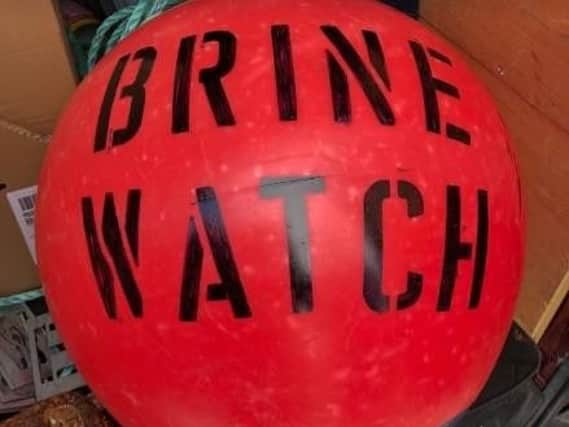Plans to gauge brine levels in Fleetwood stepped up as controversial scheme looms


The brine deposits - at the rate of 80,000 cubic metres every day for 10 years - are to be pumped out of a purpose built pipe, one-and-a-half miles out to sea, as part of the equally controversial £660 million gas storage scheme being developed at Preesall by energy firm Halite.
Halite’s energy scheme will see 900 million cubic metres of gas being stored in salt cavers under the River Wyre at high pressure, and displaced salt will be carried along the pipe in water taken from the Fish Dock and deposited into the sea as brine.
Advertisement
Hide AdAdvertisement
Hide AdBut there area fears the increased saline levels could kill marine life.


And as part of its ongoing activities, the group BrineWatch has now placed a bright red buoy directly where the pipe will empty, to help pinpoint exactly where monitoring needs to take place.
Drilling of the salt caverns and laying of the brine outfall pipe is expected to begin in the summer of 2020.
BrineWatch, made up of concerned Fylde coast residents, will hold a public meeting at Fleetwood's North Euston Hotel on Wednesday March 22, beginning at 7pm, to discuss the issue.
Advertisement
Hide AdAdvertisement
Hide AdDave Eccles of BrineWatch said: “Our buoy is now anchored 2.3 kilometres off Rossall, at the position chosen by Halite to release toxic. This will be the centre of the 100 metre ‘dead zone’


"‘We hope other local residents will be equally as concerned and will help us investigate the claims made by Halite, to prevent a possible ecological catastrophe in the future.
"There is a massive wealth of information in the public domain.
"Our aim is to form groups to investigate each area of this proposal in detail so we can fully understand and monitor the effects this will have on the future.
Advertisement
Hide AdAdvertisement
Hide Ad"We ask residents to come along to the public meeting, learn more about the proposals, ask questions, and hopefully offer help. Their support is vital if
we are to stop this’.
Mr Eccles added: "There are major concerns with the plans to pump out this huge volume of water from the fish dock at Fleetwood, needed to create gas storage caverns Over Wyre,
"This will impinge on dock water levels, the management of the lock gates themselves and the effects it will have on the registered invasive species living within dock water - similar to the grey squirrel / red squired scenario."
But Halite chief executive Keith Budinger says the brine proposals has been given the green light by the Environment Agency, Natural England, and the Marine Management Organisation, and says similar projects in other parts of the world have not caused problems.
Advertisement
Hide AdAdvertisement
Hide AdHe adds that the gas storage scheme itself and and the brine operation will be carried out to exacting specifications.
Residents wanting to help or find out more about BrineWatch should visit www.facebook.com/brinewatch.
BrineWatch adds that a website will launch shortly after the public meeting, so they can best reflect the views and concerns of those present.